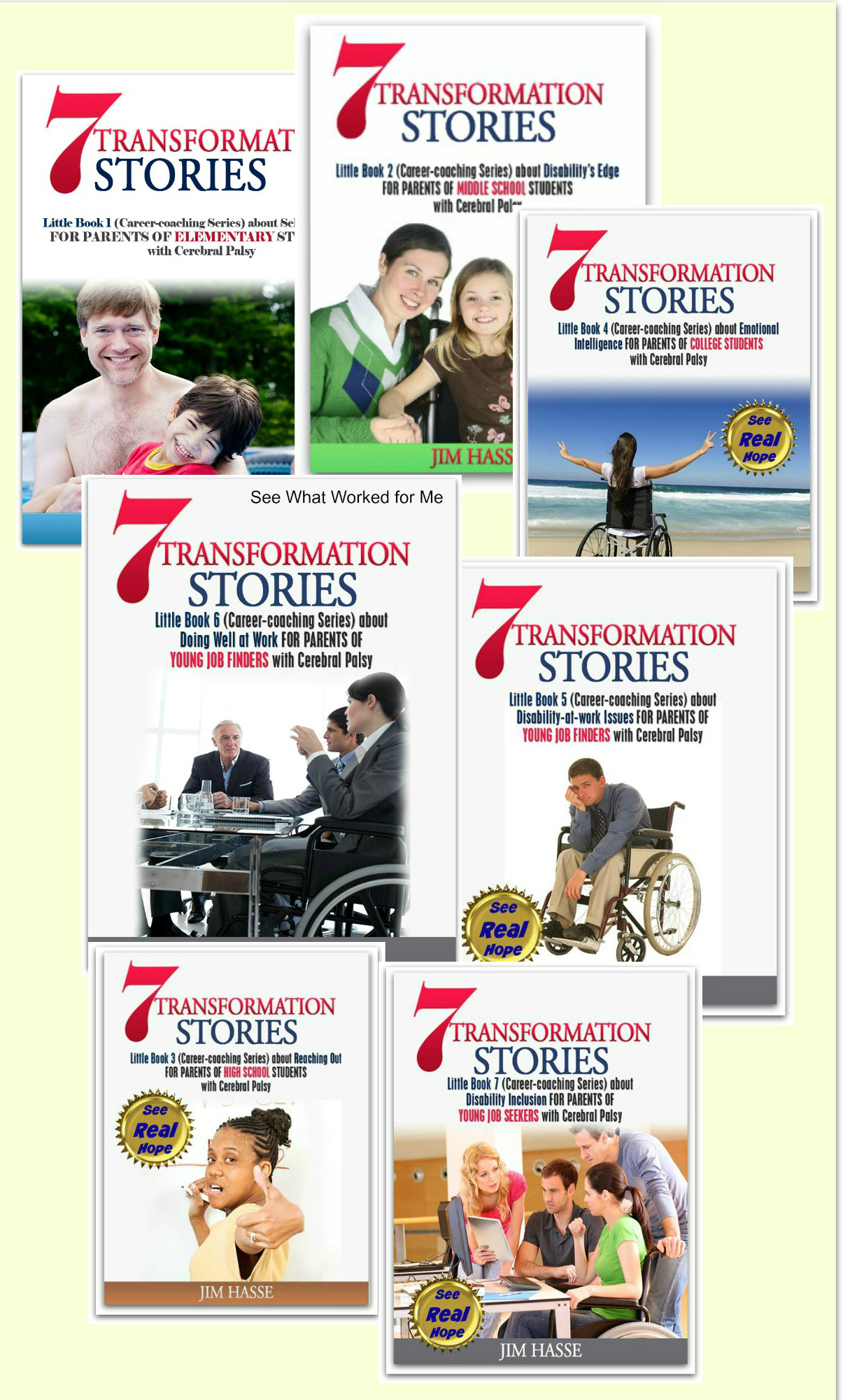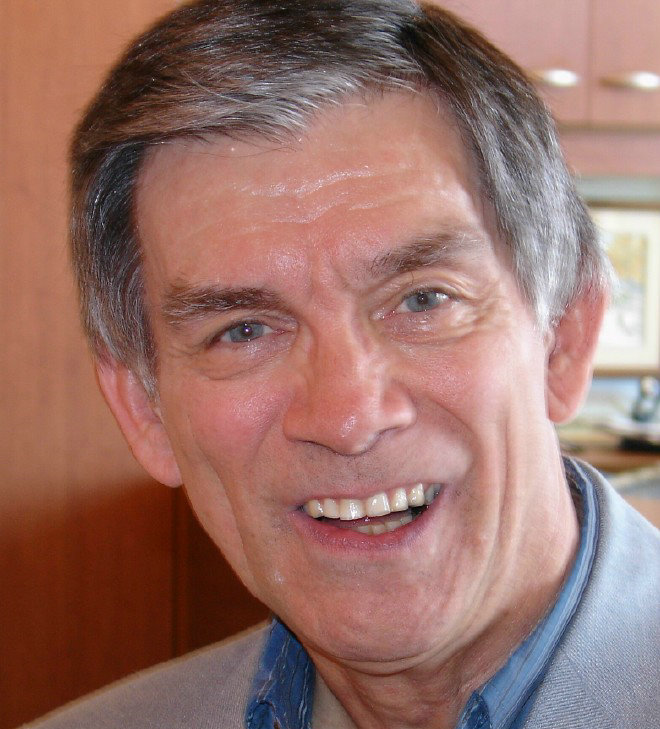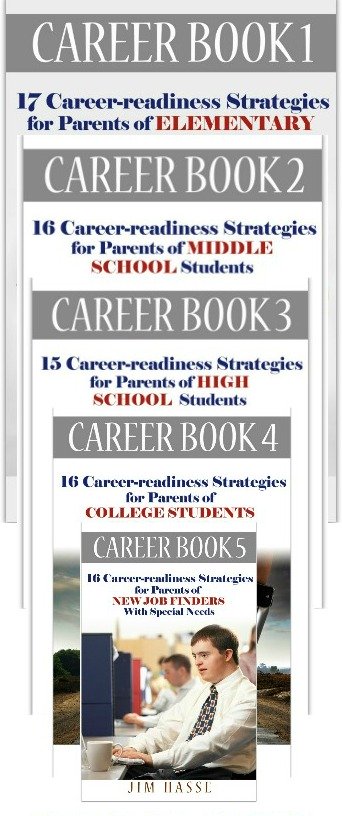How to Choose a Career: Cerebral Palsy Career Builder for Middle School
By Jim Hasse, ABC, GCDF, Disability Employment Expert
_________________________________________________________
How to choose a career may seem like a daunting task for your middle school student with cerebral palsy (CP), but the good news is that he or she is literally not alone. And, that good news applies to all of us -- those of us who are young and not-so-young, those of who are abled and disabled.
And, here's a third bit of good news: We don’t have to learn from scratch how to pick a particular a career. Our past experiences and the meaning we ascribe to them at the present moment often have a large influence on the decisions we make about our vocations.
In the American culture, we are what we do. More frequently we are asked “What do you do?” instead of “Who are you?”
And, for those in junior high school, the major field of study they choose now can help determine whether they’ll find employment that is meaningful for them 10 to 15 years when they first enter the job market of their chosen fields.
More specifically, careers turn out to be the result of a complex mix of life roles and the “DNA” of those who came before us, observes Judy Ettinger, Ph.D., L.P.C., from the Center on Education and Work (CEW) at the University of Wisconsin-Madison.
She cites career development theorist Donald E. Super’s concepts about career guidance as a platform for her views about how career decisions are made and how to choose a career. She believes the careers of family members who are important to us influence our approach to how to choose a career.
Super’s theory is that we develop our perceptions of work and career (and also refine them) through stages over our lifetimes and that, as a result, our self-concepts also change with time and experience.
He identified the importance of social policy, employment practices, peer group, family members, community, and the economy in determining our career choices. He maintained they are of equal importance to individual factors (such as our personal values, needs, interests, intelligence, and aptitudes) in how to choose a career.
Which family members influence
your youngster’s choice of a
vocation?
Join PACER’s Facebook
discussion.

The process
Genogram Development
During a CEW 2011 Summer Institute workshop, Ettinger introduced an exercise which builds on Super’s theories. She used the concept of “genograms” to help attendees trace the influence of their past patterns and current environment on their career decisions. She calls it “a narrative approach to career exploration.”
She asked the workshop of career coaches and counselors to draw their family trees with a career perceptive in mind.
I drew mine -- with a box for myself at the bottom of a blank sheet of paper, individual boxes for my mother and father in the second, my grandparents on each side of my family on the third tier and finally my influential aunts, uncles, cousins and influential people outside my family in the top tier of the page.
In each of the boxes, I noted the individual’s relationship to me, his or her particular career and the person’s outstanding characteristics.
Genogram Exploration
Then, as I examined my genogram, I asked myself the following seven questions. Here’s what I discovered while following Ettinger’s exercise.
- What did I learn about myself and my work as I examined my
genogram?
My preoccupation with writing, even as a child, has become my occupation, and that was no happenstance. My grandfather on my mother’s side was a blacksmith and didn’t go beyond sixth grade in school. Yet, he taught himself math and physics and made plowshares and shoed horses. He tinkered with the concept of a power lawn mower before it hit the consumer market. He wrote poetry and taught his new bride how to bake bread (and was known as the “fix-it” guy in his community).
My mother and father were the first to complete high school and obtain a post secondary education in their rural area. She first became a school teacher and, instead of writing poetry (like her father), later wrote and published more than 1,000 “how-to” articles for magazines and newspapers such as the Christian Science Monitor.
I remember my mother coaching me outside the classroom when I was in seventh and eighth grade about how to write concise poetry and a strong essay. - What are my positive and negative memories about the past as a
result of my genogram?
As a little boy, I had this urge to build. I would tell people I wanted to be carpenter -- to the wonderment of my grandmother on my father’s side, who downplayed my dream because she knew it was unrealistic because I had CP and have difficulty walking and talking.
When I was about eight years old, I remember playing "preacher" in the backyard with my cousins. At the time, I had an uncle and great uncle on my father's side who were pastors, and we would take turns "preaching" in no-sense language we thought closely resembled what came across to us as children in their respective congregations as they spoke from the pulpit on Sunday mornings. I naively thought I could do a better job of communicating with the entire congregation than they did, even though my own speech was garbled due to my CP. In college, it occurred to me in a lighthearted discussion with one of my classmates that I may have been an architect in my former life.
I now realize my creativity also came from my father, who, as a farmer, was quite innovative. He invented a barn drier system for hay bales and was one of the first in his community to build contour strips around his farm’s hillsides to prevent soil erosion. - What messages did I receive from my family about work roles and
about choosing a career?
Everyone in my family worked. I even washed dishes in the kitchen as a six-year-old and baled hay while in college, even though I couldn’t walk without crutches. But, I didn’t understand why the kids in a family should have to help earn the family income (such as helping on the farm). During grade school, I lived with four different “week-day house parents” at separate times over a span of seven years in a city where I could receive daily physical therapy.
From those four families, I lived under a variety of work models (where the children didn’t have to work because the parents were janitors, factory workers, school teachers, or people managers). I learned there was a life beyond farming and watched people outside my family learn how to choose a career. - Who are the key people in my life and why are they important to
me?
My mom and her youngest brother taught me independence and provided the means for gaining that independence. In fact, my uncle put in a good word about me with his boss, and that’s how I got my first job out of college.
From both, I learned the value of consistent practice with a purpose in mind and that the chief benefit of education was learning how to learn on your own -- two concepts which came in handy while I was learning how to choose a career. - In the light of my family, how do I define success and failure?
I believe success is finding my niche where I can effectively serve others and, as a result, find my sense of purpose. Failure is working with the goal of becoming best in the world instead of the best for the world. - Who in my family were most successful? Why?
My mother built a foundation of values for an extended family which has successfully made the transition from an agrarian tradition in which apprenticeship was the career builder to one in which formal education has given her grandchildren the opportunity to pursue a diverse set of careers: two thriving small business owners, a medical doctor, a soon-to-be lawyer, a priest, a process engineer, a surgeon and a renewable energy expert. - Who do I most want to be like?
My sister, first educated as a medical technologist but now manager of a pulp paper mill, reflects much of what my mother (and my grandmother on my mother’s side) was all about in terms of acquiring “people skills” and building a life based on serving others. In switching fields of endeavor, she learned how to choose a career that was appropriate for her time and place.
I see my father's creativity and imagination in my two brothers, who used that agility to successfully navigate major structural shifts in forestry and in farming during their careers. Again, each learned how to choose a career that was viable amid changing circumstances.
Do you see why I became a corporate communication executive (my first career) and a disability employment writer (my second career)?
As a mentor, you can use this exercise (developing a personal genogram and using the seven questions above to explore it) to help your middle school student with CP understand the process of career exploration and eventually learn how to choose a career.
Which family members influence
your youngster’s choice of a
vocation?
Join PACER’s Facebook
discussion.
Return from How to Choose a Career to Career Test
Go to Cerebral Palsy Career BuildersThis is Creative Commons content. You can freely and legally use, share and repurpose it for non-commercial purposes only, provided you attach this sentence and the following attribution to it (including the two links):
Originally written and illustrated by Jim Hasse, ABC, GCDF, owner of Hasse Communication Counseling, LLC, who, as a person with cerebral palsy, served for 10 years as a vice president in a Fortune 500 company during his 29-year career in corporate communication. He’s an Accredited Business Communicator, certified as a Global Career Development Facilitator and author of 14 Amazon books about disability awareness and disability employment issues.





